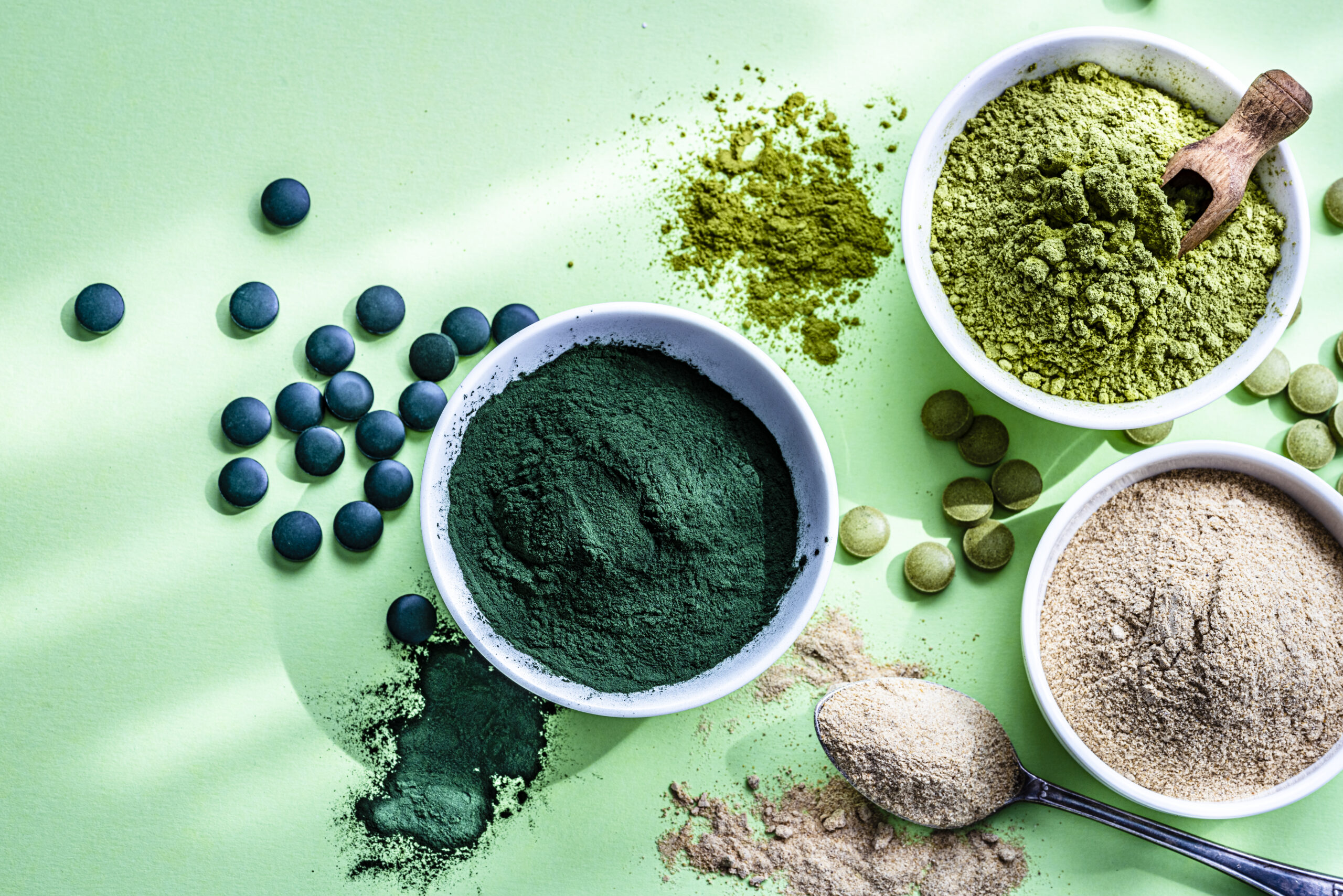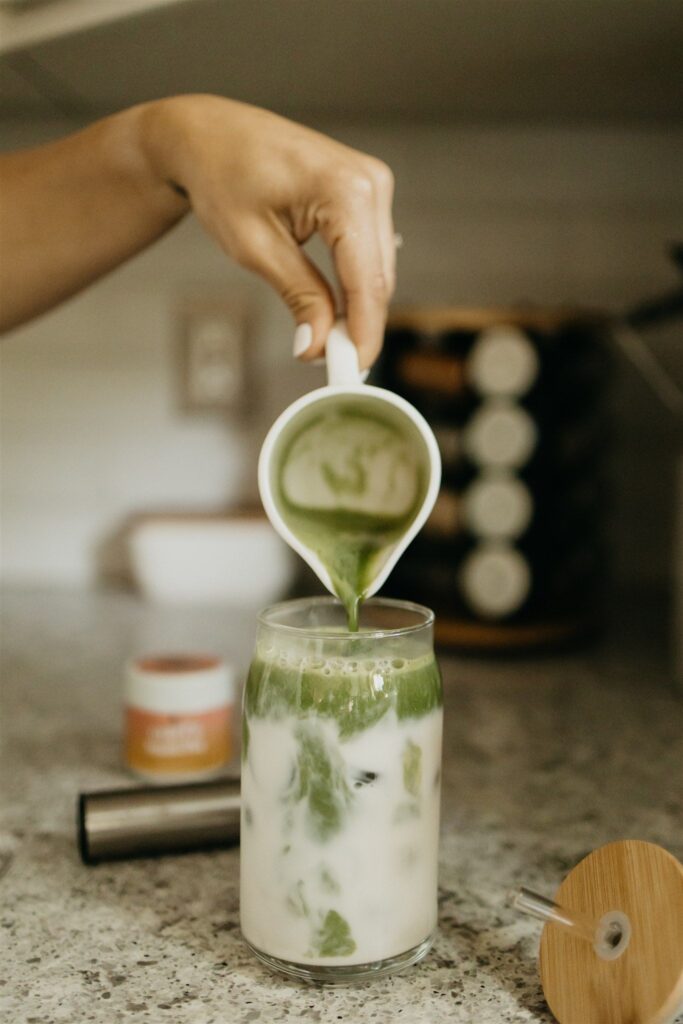What is Spirulina?
Spirulina is a type of cyanobacteria, often referred to as blue-green algae. Found in both saltwater and freshwater environments, spirulina has been consumed for centuries due to its rich nutrient profile. The Aztecs, for example, harvested spirulina from lakes and consumed it for its powerful health benefits.
In modern times, spirulina is cultivated in controlled environments and dried into powders or compressed into tablets, making it accessible for those looking to improve their diet. Its vibrant green color and earthy taste make it a unique addition to a variety of recipes and supplements.
- Nutritional supplements: Spirulina, Maca and Moringa powder
Nutritional Breakdown of Spirulina
Spirulina’s impressive nutrient content makes it a popular addition to smoothies, juices, and more. Here’s what you’ll find in just one tablespoon (7 grams) of spirulina powder:
- Protein: 4 grams of high-quality, complete protein
- Vitamin B1 (Thiamine): 11% of the Recommended Daily Intake (RDI)
- Vitamin B2 (Riboflavin): 15% of the RDI
- Vitamin B3 (Niacin): 4% of the RDI
- Copper: 21% of the RDI
- Iron: 11% of the RDI
- Small amounts of magnesium, potassium, and manganese
What’s even more impressive is that spirulina contains all nine essential amino acids, making it a complete protein source, which is rare in plant-based foods. Spirulina is also rich in antioxidants, particularly phycocyanin, which gives it its distinctive blue-green color and is known for its anti-inflammatory and immune-boosting properties.
Spirulina’s benefits go far beyond its nutrient profile.
Here are some of the top reasons to add spirulina to your routine:
1. Boosts Energy Levels
Spirulina’s high protein content, combined with its B-vitamin complex, makes it a great way to naturally boost your energy. The iron in spirulina also helps with oxygen transport in the body, which can increase endurance and fight fatigue .
2. Suppe Health
The antioxidant-rich profile of spirulina, especially its phycocyanin content, helps fight oxidative stress and supports immune function. Regular consumption of spirulina has been shown to improve the production of white blood cells, which are essential for immune defense .
3. Anti-Inflammarties
Chronic inflammation can lead to numerous health issues, from joint pain to cardiovascular diseases. The phycocyanin found in spirulina has been studied for its potent anti-inflammatory effects, which can help reduce inflammation in the body .
4. Detoxifies the Body
is known to bind with heavy metals, helping the body to detox naturally. It’s especially effective in removing toxins like arsenic, lead, and mercury from the body, making it a powerful detoxifying agent .
5. Promotes Heart Health
The comf antioxidants, anti-inflammatory properties, and cholesterol-lowering effects make spirulina beneficial for heart health. Studies have shown that spirulina can reduce LDL (“bad”) cholesterol and triglycerides while increasing HDL (“good”) cholesterol, which supports a healthy cardiovascular system .
6. Supports Weight Loss
Spirulina is nutrient-dense but low in calories, making it an ideal addition to a weight management plan. Its high protein content helps keep you feeling full, reducing hunger and preventing overeating .

Spirulina Smoothie in Bowl with Banana, Blueberries and Superfoods on Top
How to Supplement with Spirulina
Incorporating spirulina into your routine is easy and versatile! Whether you prefer it in tablet form for convenience or in powder form to mix into recipes, here are some creative ways to add spirulina to your diet:
1. Spirulina Smoothie
Add 1-2 teaspoons of spirulina powder to your favorite smoothie recipe. Its earthy taste pairs well with tropical fruits like mango, pineapple, and banana. For an extra boost, add spinach or kale for even more green goodness!
Recipe Idea:
- 1 cup almond milk
- 1 frozen banana
- 1/2 cup pineapple chunks
- 1 teaspoon spirulina powder
- A handful of spinach
- A dash of honey (optional)
Blend until smooth for a nutrient-packed start to your day!
2. Spirulina Energy Balls
For a quick, on-the-go snack, mix spirulina powder into your favorite energy ball recipe. Combine oats, nut butter, honey, and a teaspoon of spirulina for a healthy snack that’s full of protein and antioxidants.
Recipe Idea:
- 1 cup oats
- 1/2 cup almond or peanut butter
- 1/4 cup honey or maple syrup
- 1 tablespoon spirulina powder
- 1/4 cup dark chocolate chips (optional)
Roll into small balls and refrigerate for a nutritious energy boost.
3. Spirulina Salad Dressing
Spirulina can even be mixed into salad dressings for a nutrient boost. Combine olive oil, lemon juice, garlic, and a pinch of spirulina for a dressing packed with antioxidants.
Recipe Idea:
- 1/4 cup olive oil
- Juice of 1 lemon
- 1 clove garlic, minced
- 1/2 teaspoon spirulina powder
- Salt and pepper to taste
Drizzle over your favorite salad for an easy way to add spirulina to your meals.
Final Thoughts
Spirulina is one of the most nutrient-dense foods available, offering incredible health benefits from increased energy and immune support to detoxification and heart health. Its versatility makes it easy to incorporate into your daily routine, whether you mix it into smoothies, snacks, or meals.
If you’re looking to elevate your health naturally, spirulina might just be the superfood you’ve been missing. Start small, get creative with recipes, and enjoy the benefits that this powerful algae has to offer!
Love Always,
L. Lee
—
Resources:
1. Karkos, P.D., et al. (2011). Spirulina in Clinical Practice: Evidence-Based Human Applications. Evidence-Based Complementary and Alternative Medicine.
2. Khan, Z., et al. (2005). Nutritional and Therapeutic Potential of Spirulina. Current Pharmaceutical Biotechnology.
3. Gershwin, M.E., Belay, A. (2007). Spirulina in Human Nutrition and Health. CRC Press.
4. Milasius, K., et al. (2009). Effects of Spirulina on Immune Variables. Lithuanian Sports Science.
5. Lu, H.K., et al. (2010). Antioxidant Effects of Spirulina in Humans. Nutrition Research and Practice.
6. Soni, R.A., Sudhakar, K., Rana, R.S. (2017). Spirulina – From growth to nutritional product: A review. Trends in Food Science & Technology.
7. Mazokopakis, E.E., et al. (2014). The Hypolipidemic Effects of Spirulina Supplementation in a Cretan Population: A Prospective Study. Journal of the Science of Food and Agriculture.
8. Miczke, A., et al. (2016). Spirulina Platensis Supplementation and Its Effect on Weight Loss. Nutrition Research.




